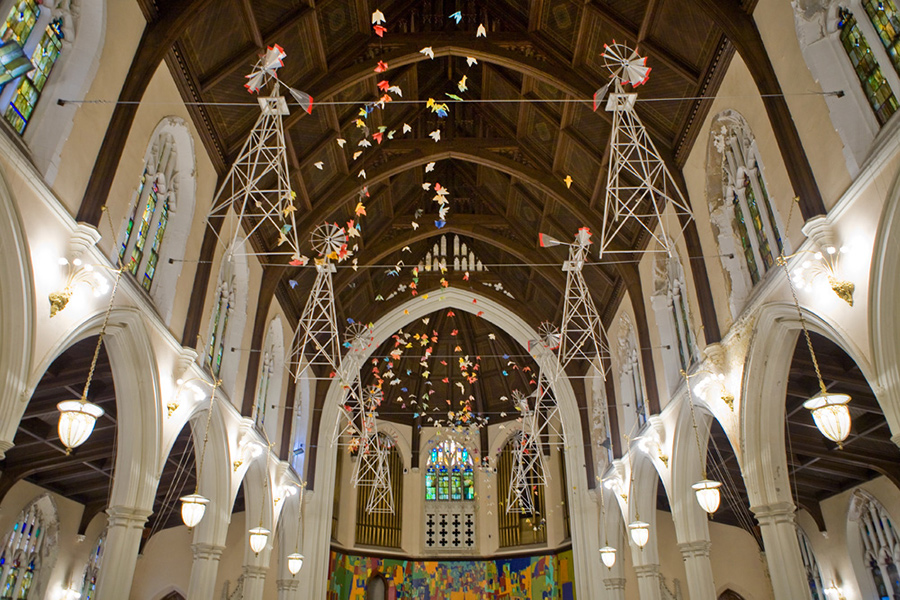Once a month, LGBT and ally congregants of Broad Street Ministry gather for conversation and community.
“It’s not about educating or about advocating, it’s just a time to really build one another up and be able to be in a safe space and be fully who they are, in relationship and community with one another,” explained BSM pastor and manager of faith worship the Rev. Sammie Evans.
While the monthly fellowship group provides the church’s LGBT members — who comprise about 13 percent of its overall approximately 115 regular congregants — an outlet, Evans said that LGBT affirmation is a natural part of Broad Street’s overall operations.
“We’ve had several queer pastors and people in leadership,” noted Evans, who herself identifies as queer. “We recognize all the gifts of God’s people. I lament and mourn for churches who are really missing out on folks who can bring incredible, beautiful gifts to their communities because they can’t see past their ingrained prejudice.”
BSM is a member of The Presbyterian Church (U.S.A.), which Evans called a “champion of LGBTQ people.” In 2012, PCUSA began allowing ordination of openly LGBT people, and later amended its Book of Order to sanction same-sex marriage.
Evans noted that some more-conservative congregations splintered with PCUSA after the 2012 decision.
“The biggest thing folks said at the time was that [LGBT acceptance] comes down to your interpretation of the Bible, and they’re exactly right,” Evans said. “First of all, it doesn’t talk about consensual, loving, same-sex and same-gender relationships. The Bible doesn’t have that concept; it’s an ancient text. The way I read scripture is, start to finish, as a narrative of good people trying to get it right and constantly getting it wrong. It chronicles a beautiful narrative of God being faithful to humans who are trying to figure it out.”
BSM uses that message to inform its own work.
“Radical hospitality is our tagline,” Evans noted. “What I’ve come to understand that to mean is that everyone shall extend and receive hospitality, no matter who they are, when they’re in that space. The experience of that is transformative.”
That inclusivity is felt at BSM’s Sunday services, Evans said, as well as its secular social-services programming, which includes at least one daily meal for those experiencing homelessness, hunger or poverty. Several-hundred people come through BSM each week for both food and other resources, including mail service, personal care, clothing and therapeutic arts. Partner organizations also offer case management, medical care, HIV/AIDS testing and referrals, legal services and more.
“The point and reason we gather together is to be in relationship with one another,” Evans said, “to extend hospitality and see one another with dignity, love and respect. We’re a community of people showing up for one another.”
Before coming to BSM three years ago, after earning her master’s of divinity from Princeton Theological Seminary, Evans said she had heard of its mission — but was impressed to see it in action.
“As an outsider, I saw this as a place where people were walking the walk. I had this vision of people just doing really great work,” she said. “But as I’ve been here, I can see that it’s so much more than that. It’s a community of people proclaiming that the world should be different. And while we’re together in that space, we act as though the world is.”
That means respecting one another’s diversity, a key component of the BSM community, she said.
The congregants represent a wide range of backgrounds, which, while a strength, can also be a challenge, Evans noted.
“We have a very diverse congregation and it’s something that people celebrate all the time but it does provide a barrier. When you are such a diverse community, with people who have different day-to-day lives and past experiences, it takes a risk and a vulnerability to be in a real relationship with one another. So my main priority for the congregation right now is getting them to be in deep, authentic relationships with one another.”
To that aim, BSM held its first Pride service at the end of June, which celebrated the contributions of its LGBT congregants and faith leaders, and the community at large.
“We had all of the lay leaders from the congregation, people who identify as LGBTQ, participate, and it was a great way to celebrate the gifts of LGBTQ folks in the community and to provide a voice and a place for worship,” she said.
In addition to deepening the relationships among congregants, Evans said she envisions BSM enhancing its advocacy work.
“Since we’ve been doing so much social-service work, our advocacy work has kind of fallen off, so right now there’s a concerted effort to provide a place for people to have a voice,” she said. “For our guests who are homeless, our LGBTQ folks, people who feel like they don’t have a voice in the world, we have a platform. We’re in the process of discerning how to enter into those conversations and provide opportunities for congregants, guests and donors, and whoever finds themselves a member of the Broad Street Ministry community, a platform and voice to proclaim to the world the need for real change.”
For more information about Broad Street Ministry, visit http://www.broadstreetministry.org.

